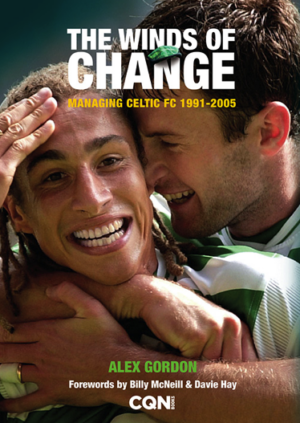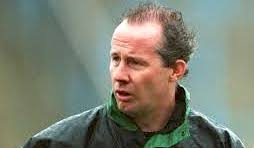LIAM BRADY was named as Billy McNeill’s successor as Celtic manager in June 1991.
The charismatic Irishman arrived with a dream for the club, but his vision had become blurred by the time he departed in early October 1993.
In another CQN EXCLUSIVE series, author Alex Gordon opens his book files to look back at an intriguing and compelling chapter in the club’s history.
Here is another edited extract from Alex’s tribute book, ‘The Winds of Change‘, published by CQN in 2015.
Please enjoy.

IN THE following fifteen league games, Pat Bonner picked the ball out of his net on fifteen occasions.
Crucially, two goals conceded came in the opening Old Firm game of the season as Rangers triumphed 2-0 at Parkhead in August and he was beaten again in the 1-1 draw at Ibrox in November.
Cultured central defender Paul Elliott had already been sold to Chelsea in the summer without Liam Brady’s knowledge, but the club tried to balance that by bringing in Gary Gillespie from Liverpool. It is often quoted that the tall, graceful Scot cost Celtic £925,000, but, in effect, he was signed without a transfer fee being paid.
Injury had wrecked the thirty-one-year-old’s career at Anfield and Liverpool were keen to offload him to any club who would pick up his wages. Celtic agreed and, unfortunately, the player continued to be plagued by setbacks at Parkhead.
He played in five successive games around the beginning of the season, making his debut against his former club Falkirk in August, a 4-1 stroll for the Hoops in which he scored one of his two goals for the club. He missed the next two games, came back for three and was sidelined again.

DEBUT BHOY…Gary Gillespie makes his first appearance against his former club Falkirk. The defender scored in a 4-1 win.
It was the story of his frustrating stay at the club he had always claimed were his ‘boyhood favourites’. He turned out sixty-nine times in a three-year period and never did himself justice in the green-and-white hoops.
In desperation, Brady tried a new double-act with Brian O’Neil partnering Mike Galloway for an October 19 meeting with Falkirk at Brockville. The new pairing misfired with disastrous consequences as Celtic lost 4-3. Barry Smith, an untested seventeen year old, was introduced for the first time as the Celtic manager shuffled his defence, still searching for a settled formula.
Clearly, the debutant wasn’t the answer to even a fraction of the problem. Smith, in fact, made only twenty appearances in four years at the club before being released. Midfielders Paul McStay, with two, and John Collins took on the mantle of scorers while their opponents gleefully bundled the goals behind Pat Bonner.
The situation transferred from grey to jet black for Brady three nights later when he presided over Celtic’s worst-ever result in Europe. The 5-1 mauling against Neuchatel Xamax was only surpassed in Gordon Strachan’s first competitive game as the club’s manager when they collapsed 5-0 to Artmedia Bratislava in a Champions League qualifier in 2005.

DUG-OUT WOES…a concerned Liam Brady.
In Switzerland, fourteen years earlier, Brady could only stare into the headlights of certain European doom. To say his formation was shambolic would be kind. He deployed Daruisz Wdowcyzk behind Derek Whyte and Mark McNally in a new-look central defence and it backfired horribly.
Three goals adrift before the interval, Celtic were being humiliated by a team of journeymen who would be dismantled 4-1 on aggregate in the following round by Real Madrid.
The next goal would be absolutely critical and yet the defence was wide open when Hossam Hassan, who scored four on the night, latched onto a long high ball and fired past a badly-positioned Pat Bonner. The keeper didn’t look too clever, either, sixteen minutes from time when he allowed a low shot to squirm from his grasp and Hassan delightedly tucked the gift into the inviting net.
Tony Cascarino’s performance against the Swiss defied description. A 6ft 3in, thirteen-stone striker being pushed and bullied by the opposition was not what Brady expected when he broke the transfer record to sign him in the summer.
The flop frontman put it this way. ‘When I wasn’t giving the ball away, I was tripping over myself. Liam pulled me off in the second-half. The fans had a real go as we walked off the pitch. Liam was incensed in the dressing room.
‘His team had played shamefully. His first managerial signing was making a mockery of him. “What the hell is going on, Tony? You were a disaster. I’ve never seen you play so badly.”‘
Cascarino uttered the immortal retort, ‘Yeah, I dunno. I was just crap.’ No-one bothered to argue.

MISFIRING MARKSMAN…struggling Tony Cascarino attempts to put the pressure on the Hibs defence.
And yet Brady believed Brian O’Neil’s superbly-headed consolation goal could yet provide the springboard to launch Celtic to an unlikely comeback triumph in Glasgow a fortnight later.
‘If we get an early goal, it will change the complexion of the game completely,’ he reasoned. ‘There’s still a chance we can do something here.’
And he would have got his wish if it hadn’t been for the waywardness of Charlie Nicholas, presented with a penalty-kick opportunity in only four minutes.
It was inconceivable that such a gifted ball-playing performer could actually miss the entire target from twelve yards, but Charlie did it with some aplomb, his dreadful effort skied so high it was more of a threat to the floodlights than it was the Neuchatel goalkeeper.
The Swiss knew it was going to be their night thereafter and even a second-half counter from Joe Miller hardly knocked them out of their stride. In the end, alas, it was a futile attempt by Celtic.
There is little doubt the defeat did a lot to affect Brady’s credibility with the support. They had witnessed the team concede four to an ordinary Falkirk team on the Saturday and then throw five into the net against an average Swiss side three days later.
The manager was savvy enough to realise he was already looking down the barrel of a gun. Neuchatel had been only his nineteenth competitive game in charge and, even for a fledgling manager, the honeymoon period was well and truly over.
Suddenly, his tactics were being scutinised and the word ‘naive’ was coming to the fore regularly.
* TOMORROW: Don’t miss the next riveting instalment of the Liam Brady story – only in your champion CQN.

